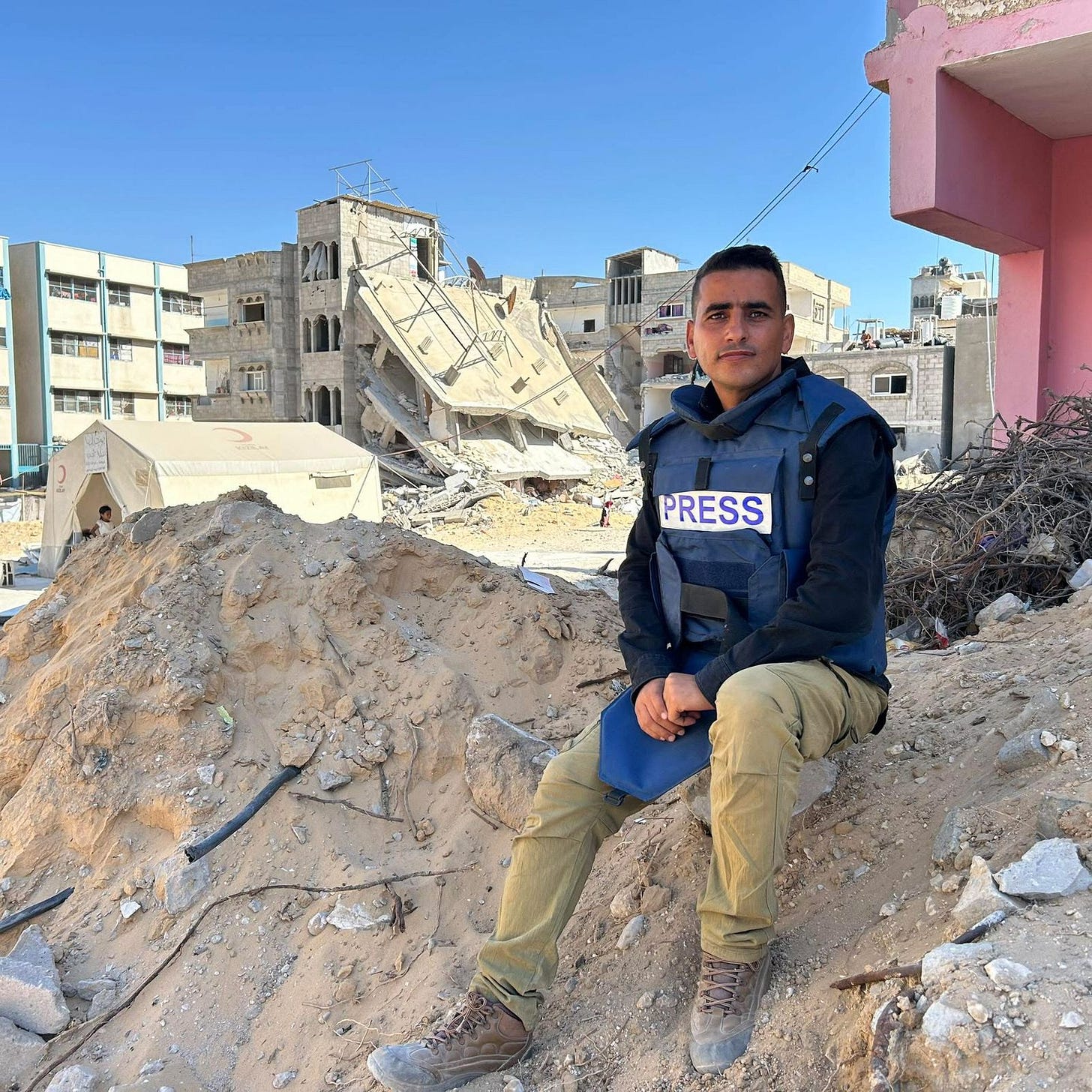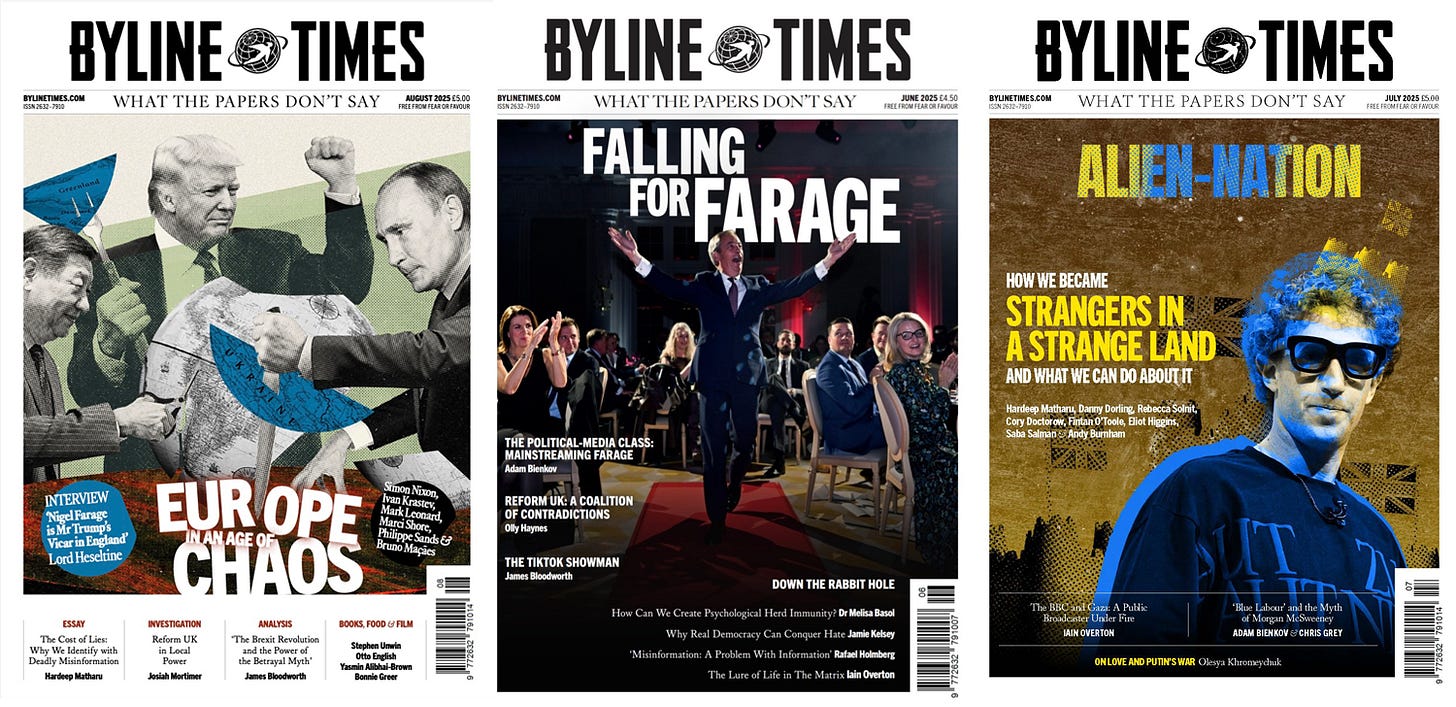The Grave that Lives Inside Him
Rana Sabbagh reports on the life of a Palestinian journalist for whom journalism has become about survival, and memory about resistance, with grief colouring everything
In August, five Al Jazeera journalists were killed in a targeted Israeli strike in Gaza. According to the Committee to Protect Journalists, 186 journalists have been confirmed as killed since the start of October 2023.
Mohamed Abu Shahma left his singlet hanging on a rusty nail by the door – the one marked ‘press’ in fading white letters – and stepped out to buy some bread one day last March. Minutes later, his house was bombed into rubble.
The blast destroyed more than his walls. It took Mohamed’s winter coat; the mattress on which his youngest daughter, two-year-old Massa, cried into the night whenever a rocket fell nearby; and his laptop, storing months of interviews – some published, others that never would be.
Just two months earlier, he had moved his family into the rented house in Khan Yunis. He had used up his remaining assets and taken a loan from a friend to secure the deal. The only saving grace is that he survived – and few in Gaza can count on that.
The war, unleashed by Hamas’ deadly attack 22 months ago, triggered an Israeli response that has featured prolonged, indiscriminate bombing; the killing of 60,000 Palestinians, mostly women and children; and a blockade on food, medicine, and water – actions widely condemned by growing numbers of countries and even Israeli human rights groups as genocide.
Mohammad is 37 but has the voice of an older man – reporting, as he does, from inside Gaza’s trauma, unable to detach himself and observe it from a distance.
His once healthy, full face with bright hazel brown eyes, has turned thin and pale. The eyes have become lifeless; a silent marker of emotional pain, says a friend who checks on him every day.
There is nowhere he can separate from the conflict. It is the air he breathes, the silence between his children’s questions, the camera strap that he now feels is too heavy to wear.
“You don’t plan anymore,” he says. “You don’t think about tomorrow because you’re not sure you will be alive in the next second.”
When he scrolls through his Facebook, he does not see birthdays or celebrations of family and friends. He sees obituaries. Familiar names disappearing. Ten at a time.
“The mind no longer opens towards the future,” he adds. “The horizon is shut.”
I interviewed Mohamed for four hours over two days – a conversation frequently interrupted by his tears and the constant internet disruptions.
Some days he cries without warning.
At other times he forgets how to feel anything at all. Panic is no longer triggered by the sound of Israeli drones hovering across the Gaza sky. It arrives with the silence in moments of reflection, when his wife, five children, and ageing mother are finally asleep on four mattresses in a 20 square metre tent, and there is nothing left but to wonder what will happen next.
Fear attaches to every aspect of life – including the ordinary and mundane.
“We left all our winter clothes behind,” he says. “There is nothing now. No jackets. No blankets. Two cooking pots and five plates.”
He speaks of his eldest daughter Sara, 12, with shame. She is old enough to enter womanhood, he says, but there are no sanitary pads, no conversation, and no privacy inside their tent.
The war, he says, has robbed her of her childhood. Some days she stands for hours in long queues for water or food, often returning in tears with nothing. It is too much responsibility, says Mohamed, for a child.
In another world, he might have been a mentor to younger reporters. Perhaps a bureau chief. In Gaza, he is a man clinging to memory, trying to document reality before it dissolves.
“What is fear?” he asks. “Fear is living with your death in your mouth. Every moment.”
Not everyone dies quickly in this war with its rockets and bombs – there is also a much slower death from the disintegration of daily rituals and standards.
Gone is the quiet dignity of folded clothes, the press of a warm jacket in winter, the silence of a sleeping child. The absence of a private toilet is an issue that has crushed Mohamed’s remaining sense of dignity.
Last June, he won the prestigious Samir Kassir Prize for investigative reporting – a plaque made of brass and plexiglas, was kept for him by a friend in Beirut, as he could not travel to receive it in person. He worries that he might not live long enough even to see it.
In April, three of his colleagues were burned to death and another five injured when a rocket hit the tent where they all worked. Shocked and saddened, he sat down and wrote his will.
Since the war began, Mohamed has been displaced seven times as Israeli evacuation orders have broadened and multiplied. No sooner do the Gazans arrive in one location, than they are forced to move again. Their homes, offices, and institutions have been methodically pummelled into extinction.
Mohammad did not set out to witness death or document mass graves. But in Gaza, journalism offers no safe or sanitised assignment.
Covering a mass burial is one of his worst experiences.
As he tells it, a year ago, some 100 corpses were being transported in an Israeli truck for burial in Gaza. Some were already beginning to decay. Others had limbs missing. Heads were hanging from bodies. No Names. No respect.
“The Ministry of Health refused to take them,” he says. “They did not know who they were. They had no identity tags. So, the bodies were just lying for days in an open space by the roadside.”
Eventually, bulldozers arrived. Not to rescue, but to bury. “They lifted the bodies with metal claws. Dropped them into an open pit, covered it and left.”
Locals then put them in a mass grave. He says it was the worst day of his life.
“I couldn’t sleep,” Mohamed recalls. “The smell, the bones, the mother who recognised a watch on a disjointed arm and screamed ‘that’s my son!’ But it wasn’t.”
He documented it anyway. Because someone had to.
In Gaza, journalism is not just about ‘truth’. It is about preserving what was done and said and believed at the time – memory as resistance to what are seen as attempts to erase Palestinian identity.
“If I don’t speak,” he says, “or report on what is unfolding before my eyes, who will?”
Ask him what he thinks about Israel, and he steers clear of slogans. He just remembers the bulldozer.
“They dumped the bodies like trash,” he says. “No dignity. Just gone.”
He does not speak in anger. But the hurt runs deep.
“It is not just the killing,” Mohamed says. “It is how they erase us afterwards. The way the world, the West, the Arabs, let it happen without lifting a finger.”
Remarkably, perhaps, he talks without hatred towards Israel.
For him, “there are good and bad people on both sides. I make a difference between Zionists and Israelis. Many Israelis are protesting. They want the war to stop. They want us to have food”.
Would he ever work with Israeli journalists and investigators to document and expose war crimes? He would.
Without any hesitation, he would engage with the likes of Haaretz’s Gideon Levy, the Israeli journalist and author famed for his opinion pieces, focusing on the Israeli occupation of Palestinian land, and for +972, an independent online, non-profit magazine run by a group of Israeli and Palestinian journalists.
“We are driven by the same values at the core of which lies human rights, justice, and holding the powerful to account for their abuses,” he explains.
But each day, the prospect of a just outcome appears to become more distant. More so, since Israeli-Hamas negotiations to stop the nearly two-year war have collapsed and Israel’s Government is finalising a plan to re-occupy the entire Gaza Strip.
“I never expected Israel’s occupation of Gaza would return,” Mohamed says, referring to Israel’s 2005 withdrawal from the Strip when he was in his teens. “But now, we are living under something that is worse than occupation. Israel has the worst government now.”
Some nights, Mohamed forgets how to speak. Other times, he talks too much – afraid that silence will finish what the airstrikes tried and failed to do. When he dreams, it is always the same.
The mass grave. The watch. The scream. The hands of the dead. Stacked like broken branches. That grave with its discarded, unidentified bodies, lives in him now.
“I can’t explain what I saw,” he says. “I can only carry it.”
So, he does.
He carries the grave. The coat. The names. The daughter who is growing up too fast. The family and friends buried without headlines or time to grieve their loss.
He carries the story. He does not ask for pity. Only memory.
“If I die, tell them we were here,” Mohamed says. “We were peace-loving humans. Tell them we mattered.”
This article first appeared in edition #77 of Byline Times




Agonizing read. If only the world leaders would DO SOMETHING.